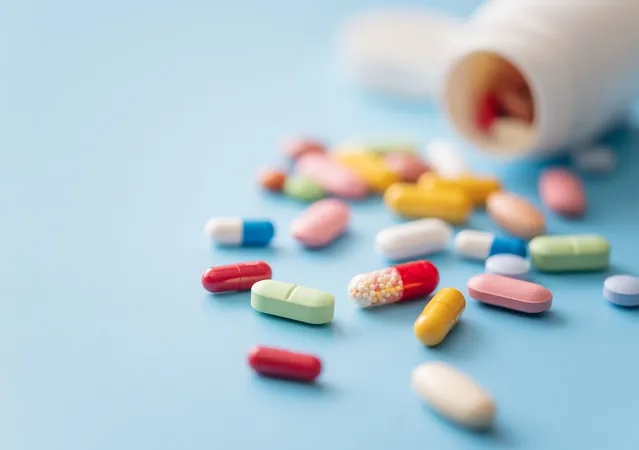
Breakthrough Study Reveals How Gut Bacteria Sabotage Popular Medications
2025-04-04
Author: Wei
A groundbreaking study from the University of Pittsburgh and Yale University has unveiled a startling link between our gut bacteria and the effectiveness of common medications designed to target G protein-coupled receptors (GPCRs). Published in the prestigious journal Nature Chemistry, this research could revolutionize our understanding of over 400 medications used to treat a variety of conditions, including migraines, depression, type 2 diabetes, and even certain cancers.
Dr. Qihao Wu, the first author of the study and assistant professor at the University of Pittsburgh, emphasized the importance of understanding the interactions between GPCR-targeted drugs and gut microbiota. "This knowledge is crucial for advancing personalized medicine initiatives," he stated. The implications of this research extend beyond academic curiosity; it could significantly inform future drug design and therapeutic optimization.
GPCR-targeting medications constitute a large portion of FDA-approved drugs, but their effectiveness can vary dramatically among individuals. Factors such as age, genetics, diet, and now the gut microbiome have been shown to influence how well these treatments work. This new study aimed to explore whether specific bacteria could alter the chemical structure of these widely-used drugs, consequently diminishing their therapeutic effects.
Utilizing an innovative experimental approach, the research team created a synthetic microbial community composed of 30 common bacterial strains found in the human gut. They then exposed this bacterial mixture to 127 GPCR-targeting drugs to determine if any chemical transformations occurred. The results were eye-opening: the bacteria metabolized 30 out of the 127 drugs tested, with 12 undergoing significant changes that reduced the original drug’s efficacy.
One notable example was iloperidone, a medication approved for treating schizophrenia and bipolar disorder. Researchers found that the bacterium Morganella morganii significantly metabolized iloperidone, converting it into several inactive compounds during laboratory tests and in mice. This pattern of degradation serves as a cautionary tale about the potential for gut bacteria to undermine drug effectiveness in certain patients.
The implications of this discovery are profound, suggesting that gut bacteria are not merely passive inhabitants of our digestive system but active participants in how our bodies process medications. This insight could pave the way for developing new treatment protocols that factor in the microbiome or recommend adjustments to existing drug prescriptions.
Additionally, the research team highlighted the intriguing possibility that the gut microbiome may also play a protective role regarding certain dietary compounds, known as phytochemicals. "We identified a couple of phytochemicals in corn that may affect gut barrier function," Dr. Wu noted, pondering the dual role of gut bacteria in both drug metabolism and dietary detoxification.
Moving forward, Wu and his research team aim to unravel the metabolic pathways responsible for these bacterial transformations. Their goal is to deepen our comprehension of how gut bacteria influence drug efficacy, ultimately contributing to more personalized treatments that incorporate individual variations in gut microbiota. This pivotal research not only sheds light on the intricacies of drug metabolism but also offers a tantalizing glimpse into the future of targeted and customized therapies—a future where your gut might just determine what medicine works best for you!




 Brasil (PT)
Brasil (PT)
 Canada (EN)
Canada (EN)
 Chile (ES)
Chile (ES)
 Česko (CS)
Česko (CS)
 대한민국 (KO)
대한민국 (KO)
 España (ES)
España (ES)
 France (FR)
France (FR)
 Hong Kong (EN)
Hong Kong (EN)
 Italia (IT)
Italia (IT)
 日本 (JA)
日本 (JA)
 Magyarország (HU)
Magyarország (HU)
 Norge (NO)
Norge (NO)
 Polska (PL)
Polska (PL)
 Schweiz (DE)
Schweiz (DE)
 Singapore (EN)
Singapore (EN)
 Sverige (SV)
Sverige (SV)
 Suomi (FI)
Suomi (FI)
 Türkiye (TR)
Türkiye (TR)
 الإمارات العربية المتحدة (AR)
الإمارات العربية المتحدة (AR)